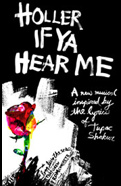Are Critics Scared of Holler If Ya Hear Me? Producers Talk Up New Ad Campaign Targeting Hip-Hop Crowd
“Most critics are scared of this show…they should be,” reads one of Holler If Ya Hear Me’s newest promotional materials, which aims to get hip-hop fans into the seats of the Palace Theatre, where the new Tupac Shakur musical opened last month. The striking new campaign comes from Cornerstone Agency, a branding and strategy company that is better known in the music world than on Broadway. But will these fighting words help the hard-hitting show find the right audience?
“It’s part of something we talked a lot about—this #OccupyBroadway thing,” Holler producer Eric Gold told Broadway.com, referencing the campaign's chief tagline, "Hip hop has come to #OccupyBroadway." The hashtag recalls a familiar plea from "the 99%" for social and economic equality.
“People feel that Broadway has become a one percent of the population experience. There was some feeling that some critics looked at it from a traditional sort of one percent viewpoint," Gold explained. "There's been a dichotomy between how some of the established Broadway reviewers have seen the show and how non-traditional Broadway, music-oriented, hip-hop and African-American press viewed the show."
There is no denying that those "established Broadway reviewers" Gold mentioned don't reflect the contemporary urban community seen on the Palace Theatre stage nightly. Of the 22 members of the 2013-14 New York Drama Critics' Circle, only one is African American (Hilton Als of The New Yorker, who didn't review the show).
Responding to reviews that call the show’s book cliché, producer Jessica Green said, “There’s a disconnect [between traditional media and] these actual communities. When you're talking to people who live in these communities, they're seeing themselves on stage. They're not seeing their stories as already being told—especially on Broadway.” She added, “Some [critics] just don’t know how to evaluate it.”
OK, but are critics "scared" of Holler If Ya Hear Me? "I'm sure their criticisms of the show, from their point of view, are valid," Gold said. "As a producer, you always want to be defensive about the show."
One method of being "defensive" is the musical's new positioning with a campaign designed to evolve and adapt Holler's image. “Our early stuff [from theater advertising and marketing firm AKA], while pretty and meant to create awareness, didn’t really clarify what the show is or stay in theme with the edge of the show,” Gold said.
While AKA has a more traditional approach, Gold and Green are working with Cornerstone specifically to reach an urban and hip-hop crowd. The producers discovered the need for two types of outreach when they found contrary responses to their ad campaign: traditional Broadway theatergoers thought there was too much about Tupac, while hip-hop fans wanted more Tupac-related content. “We basically came right at Broadway first; now we’re pivoting and going at hip hop,” said Gold. “The idea is to have them work in parallel and then come together.”
Cornerstone’s approach includes social media graphics that emphasize individual characters alongside Tupac’s words (seen below). Additionally, the agency is implementing grassroots marketing (such as street teams) and outdoor placements to spread buzz.
“It’s OK if you don’t like it," Gold said about the show, "but come and see it first before you judge it.”

